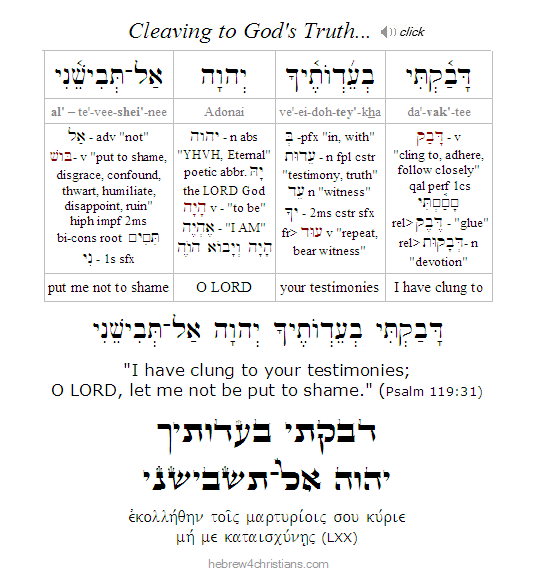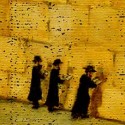|
The theme of the fragility of life is part of the sober message of Tishah B'Av. After all, the great symbol of God's manifest presence on the earth, the Holy Temple, went up in smoke, and the very place (i.e., ha-makom: ◊Ē÷∑◊ě÷ľ÷ł◊ß◊ē÷Ļ◊Ě) where the LORD chose to "put His Name" was utterly destroyed. As the people were taken captive and led into exile, the great vision of Zion appeared to be forever lost (Psalm 137:1-4).
The LORD had forewarned that exile, persecution and progressively worse punishments would befall the people if they would break faith with Him (see Lev. 26:14-46). But how could all this have happened? Notice that the "rebuke" portion of the tochachah begins with ve'im loh tishme'u li (◊ē÷į◊ź÷ī◊Ě÷ĺ◊ú◊ź ◊™÷ī◊©◊Ā÷į◊ě÷į◊Ę◊ē÷ľ ◊ú÷ī◊ô), "if you do not listen to me" (Lev. 26:14), which recalls the Shema and the duty to love the Lord bekhol levavkha, "with all your heart." The sages point out that the refrain "if you walk contrary to me" (◊ē÷∑◊Ē÷≤◊ú÷∑◊õ÷į◊™÷ľ÷∂◊Ě ◊Ę÷ī◊ě÷ľ÷ī◊ô ◊Ď÷ľ÷į◊ß÷∂◊®÷ī◊ô) - which occurs several times during the rebuke - really means "if you walk carelessly (i.e., keri: ◊ß÷į◊®÷ī◊ô) with me." The commentator Rashi notes that the verb karah (◊ß÷ł◊®÷ł◊Ē) means "to befall" or "to happen" and therefore suggests a sense of randomness (the related word mikreh [◊ě÷ī◊ß÷į◊®÷∂◊Ē] means "coincidence"). If the people regarded the events of life as "random," then God would reciprocate by bringing senseless trouble into their lives. For this reason a careless attitude about the things of God is the first step toward apostasy...
It's been said that the opposite of love isn't hate, but rather indifference, and that explains why punishments came when the people "left their first love." If you walk carelessly with God, then you may be afflicted with "troubles of love" (i.e., yissurei ahavah: ◊ô÷ī◊°÷ľ◊ē÷ľ◊®÷Ķ◊ô ◊ź÷∑◊Ē÷≤◊Ď÷ł◊Ē), that is, with various difficulties, intended to help you "come to your senses," to help you wake up, and to cause you return to the LORD for healing... This is a severe mercy of God.
A parable attempts to explain the heart behind Tishah B'Av and the tragic destruction of the Temple: Once a great artist desire to paint his greatest masterpiece, and journeyed with his companion to the top of a high mountain to find the perfect view. After several days, the painting was complete, though the artist began to view his work at different angles to see what improvements might be made. He started walking backward, admiring his work. He continued to pace backward, focusing only on his painting, when he approached the edge of a cliff. When his friend realized the danger, he called out for him to stop, but the artist took no heed to his words. At the last moment, when he was about to plunge to his certain death, however, his friend picked up a knife, ran to the picture, and began slashing it to pieces, destroying the masterpiece before the artist's eyes. "What are you doing!" the artist cried out, having finally come to his senses. "Look behind you and you'll see why I did it" replied the friend. Similarly with God. He tried to warn the people to turn back to Him lest they perish, but they refused to heed His words, so finally He allowed the Temple to be destroyed so that the people themselves could come to their senses and many would escape with their lives....
The daily sacrifice at the Temple was a defect-free lamb that was offered both in the evening and in the morning - a continual sacrifice by fire to God... Ultimately the Temple itself was a means to the greater end of revealing Yeshua as the Lamb of God who takes away the sins of the world. And just as the Sacred Name (◊ô◊Ē◊ē◊Ē) transcends temporal things - even things as wonderful as the Holy Temple itself - so the Temple was meant to point to Messiah - and to the innermost chamber of our heart that receives Him (1 Cor. 6:19).
The idea of tochachah is not simply something for ethnic Israel, of course, since the New Testament likewise warns us that God will punish those who likewise walk carelessly (i.e., keri: ◊ß÷į◊®÷ī◊ô) with Him. Have you forgotten the exhortation that addresses you as God's children? "My son, do not regard lightly (ŠĹÄőĽőĻő≥ŠĹĹŌĀőĶőĻ) the discipline of the Lord, nor be weary by his reproof (◊™÷ľ◊ē÷Ļ◊õ÷Ķ◊ó÷ł◊Ē). For the Lord disciplines the one he loves, and reproves (◊ô◊ē÷Ļ◊õ÷ī◊ô◊ó÷∑) every child whom he receives" (Heb. 12:5-6; Prov. 3:11-12). The Lord charged the assembly at Ephesus that they had let go of their first love. Yeshua therefore urged them: "Remember from what high state you have fallen and repent! Do the deeds (ŠľĒŌĀő≥őĪ) you did at the first; if not, I will come to you and remove your menorah from its place ‚Äď unless you repent" (Rev. 2:4-5). "God is not mocked (őľŌÖőļŌĄő∑ŌĀŠĹ∑ő∂ŌČ - lit., "to turn up the nose at"), and what a man sows, he also reaps" (Gal. 6:7; Psalm 39:11). There are abiding consequences for the choices we make in our lives. "For you may be sure of this, that everyone who is sexually immoral or impure, or who is covetous (that is, an idolater), has no inheritance in the kingdom of Messiah and God. Let no one deceive you with empty words, for because of these things the wrath of God comes upon the sons of disobedience" (Eph. 5:6-7).
Note: It is written, "Pain (or grief) handled in God's way produces a turning from sin to God (◊™÷ľ÷į◊©◊Ā◊ē÷ľ◊Ď÷ł◊Ē) which leads to salvation (◊ô÷į◊©◊Ā◊ē÷ľ◊Ę÷ł◊Ē), and there is nothing to regret in that! But pain handled in the world's way produces only death" (2 Cor. 7:10). A common definition of insanity is doing the same thing over and over again and expecting different results. The world's "logic" for dealing with inner pain is to do things that will suppress it, thereby guaranteeing more pain. The only way out is through... During Tishah B'Av we weep over our sins that have brought us exile. The sages note that the word "weeping," i.e., ◊Ď÷ľ÷į◊õ÷ī◊ô, has the same numeric value as the word for "heart," i.e., ◊ú◊Ď. We weep from the heart, then, because the heart itself is what needs to be healed...
Hebrew Lesson
Psalm 119:31 Hebrew reading (click for audio):
 |
|


